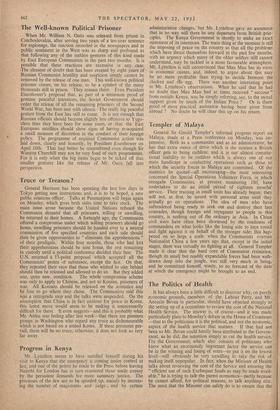Truce or Treason ?
General Harrison has been spending the last few days in Tokyo getting new instructions and, it is to be hoped, a new public relations officer. Talks at Panmunjom will begin again on Monday, which gives both sides time to take stock. The main issue arose because the United Nations refused the Communist demand that all prisoners, willing or unwilling, be returned to their homes. A fortnight ago, the Communists offered a compromise under which willing prisoners should go home, unwilling prisoners should be handed over to a neutral commission of five specified countries and each side should then be given opportunities to " eliminate the apprehensions " of their prodigals. Within four months, those who had lost their apprehensions should be sent home, the rest remaining in custody until a political conference decided their fate. The U.N. returned a 13-point proposal which accepted all the Communists' points of substance, except the last. On that, they repeated their view that those who wished to stay behind should then be released and allowed to do so. But they added one, quite new, condition. The whole compromise scheme was only to apply to Chinese, and not to Korean, prisoners of war. All Koreans should be released on the armistice and be free to go where they chose. The Communists said this was a retrograde step and the talks were suspended. On the assumption that China is in fact anxious for peace in Korea, this latest move would seem to be making it unnecessarily difficult for them. It even suggests—and this is probably what Mr. Attlee was feeling after last week—that there are pressure groups in Washington who regard any truce as dishonourable which is not based on a united Korea. If these pressures pre- vail, there will be no truce; otherwise, it does not look so very far away.


































 Previous page
Previous page